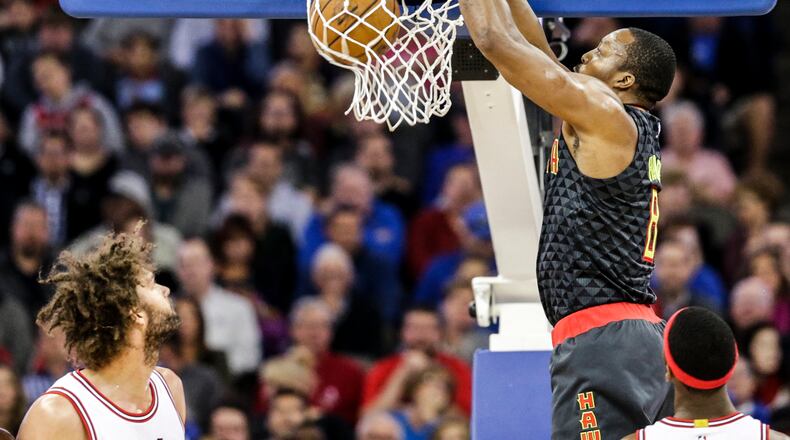Dwight Howard is more than just the immovable object.
The Hawks center is one of the best screeners in the NBA and it’s not just because of his size. Sure he’s listed at 6-foot-11 and 265 pounds. As it turns out, there is more to setting an effective screen than bulk.
Magic coach Frank Vogel referred to Howard as the “strongest center in the league” several times before this week’s game against the Hawks. That certainly helps.
“There is an art to screening,” Hawks coach Mike Budenholzer said. “It’s more than just being big. I think there is a commitment to being a good screener, too. He’s really helped us. I think it’s something that we prioritized and put an emphasis on. Adding him has been helpful to anybody coming off screens.”
That was part of the plan when the Hawks signed Howard during the summer. In addition to his rebounding, rim protection and inside presence, Howard could be a cog in the Hawks’ offense by setting screens. A good screen can turn into an opportunity at the rim for Howard or another or an open look for an outside shooter.
“So much of screening is just having a feel for it, frankly,” said Hornets coach Steve Clifford, who was an assistant with Howard during stops with the Magic and Lakers. “He always, you go back to Orlando, we were just (four outside players surrounding Howard’s rolls to the basket off screens). They are doing a lot of the same things now. He always had a great feel for the angles.
“In this league, the screeners job really starts with not letting the defender to get under which is going to force (defensive) rotation. He, from the first day he was there, Stan (Van Gundy) said ‘You know what? He knows how to screen.’ It would seem like a simple thing and it’s not. We work on it every day and it’s still not an easy thing to do.
“For the pick-and-roll game, it sets everything up. The other part is that he has a roll game. He can roll with speed naturally, which is another thing that guys who can’t do that, it’s hard to teach them how to do. He gives them both a good screener and somebody who is going to go hard to the rim. You are going to have to get there. He’s going to roll below his man. That puts pressure on your defense.”
The option of getting Howard the ball off the screen is part of the work in progress that is the Hawks’ offense. Budenholzer cited an old basketball saying that the player who sets the screen is often open.
The Hawks have shown glimpses of getting Howard the ball via the lob pass. At times, was the offense struggled, it was forced. However, there have been games where it was used to great success.
The next area is for Howard to get the ball off screens on the half roll, where he gets the ball immediately away from the basket and has several decisions to make. He can continue to the basket hard or pass to an open shooter. That court vision has been a work in progress, according to Budenholzer, with signs of improvement.
“That’s where he is learning and growing,” Budenholzer said. “(Against the Magic), he had the right idea, the right mindset. Now, it’s just taking it and executing it better. I’m actually encouraged. I think he’s seeing and thinking about the whole court. It’s a skill that is somewhat new. I think with time and repetition, he’s going to get better with it. It’s going to take some time.”



